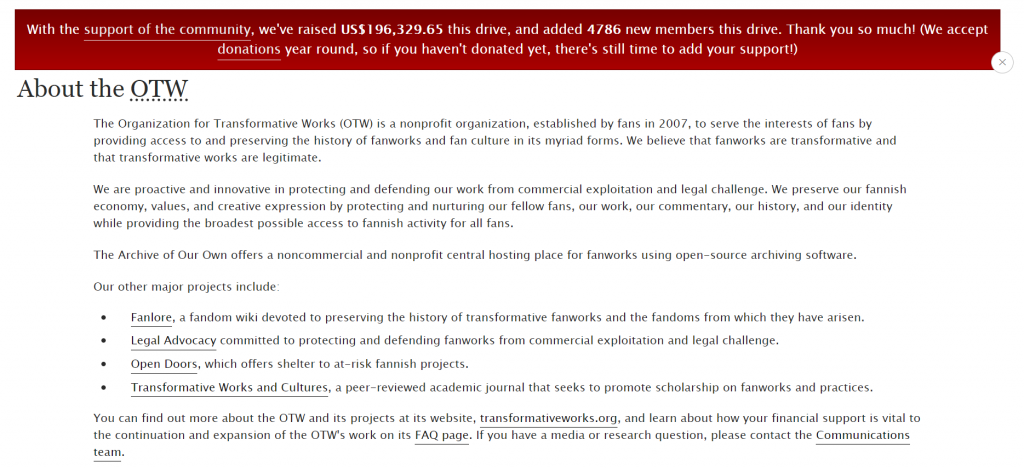Fanfiction has existed long before the internet came up with the terminology for it. Before Wattpad and Fifty Shades of Gray, there was Dante with his Divine Comedy, which, by today’s fandom terminology standards, might be deemed as a self-insert fanfiction of the Bible (and here is a list of more classics that could technically be called fanfiction if you’re interested). If you’re completely unfamiliar with the concept, fanfiction is “fictional writing written in an amateur capacity [by] fans, unauthorized by, but based on an existing work of fiction” [1]. Essentially, the writers of fanfiction take an already existing piece of entertainment media (a comic book, TV show, video game, etc), and create original stories within the same world and/or with the same characters from the original works (of course, this definition is just scratching the surface). As mentioned before, fanfiction has been around for much longer than the internet has; however, with the arrival of the internet, it became much more widespread. With blogs and websites created specifically for fans of the same shows and books, soon came the first websites dedicated to publishing fanfiction online.
The Creation of Archive Of Our Own
In 2007, the website FanLib came under fire as they attempted to monetize fanfiction on their site, which had been active since 2003 in allowing its users to publish fan-work. This caused a lot of outrage online amongst both writers and readers of fanfiction. The idea of monetization of fan-work not only took away the accessibility of fanfiction, which was a large part of the fostering of the community, but it also did not benefit many authors. Furthermore, a large part of the outrage was linked to the fact that FanLib was ran only by men, while the majority of fanfiction writers were women. Sparking many discussions of ethicality regarding authorial rights and accessibility, the site Archive of Our Own (often abbreviated to AO3) was born in 2008 to fight for the rights of fanfiction authors [2]. As an early commentator on the site remarked on the problems with monetization of fanfiction, as well as importance of acknowledging female creators as a large part of the community,
[e]very time I see big shiny celebrations of fan culture that completely ignore 40 years of women’s creative work, I want to not only let my freak flag fly, but march up and down the streets with it — and then something else (lately fanlib, but it’s far from the first) reminds me that getting out there without doing it on our own terms is only a small part of the battle. [Archive of Our Own] seems like a fan-culture site that gets our culture while really making the most of the internet as it is now (as opposed to publicizing fan work just for the sake of ad dollars or eyeball-share or whatthehellever)… oh, yes. [3]
AO3 stood out to many fans as an organisation that understood their needs – it not only allowed authors to post their works for free on a website that was accessible to anyone, but also sought to create an actual archive of fan-work. It was “designed and coded primarily by women to meet the needs of the online fandom community” [4]. Though getting through the first years of its existence was difficult financially, AO3 “crawled its way into the world while refusing to incentivize labor nor make money from advertising. Above everything, the young organization was firm in its decision to remain non-commercial” [5]. Amazingly, AO3 still stands by this choice to this day. Their main funding comes from donations from the users of the website; each year they ask for about 40’000$ in donations from their supporters, and each year they receive about triple the amount. The money they receive goes not only into the expected expenses of keeping and maintaining their website and archive, but also to providing legal support to the authors for “protecting and defending fanworks from commercial exploitation and legal challenge” [6].

Though I don’t partake in fandom culture much these days, stories like these remind me of the better parts of the internet, where people can come together and fight for a good cause. It gives me hope that, while the internet is often divided on many issues, people can still fight against exploitation of fan-works, and for the accessibility of media, and be successful. For my closing thoughts, I will leave you with the TikTok that inspired this blog post:



Recent Comments